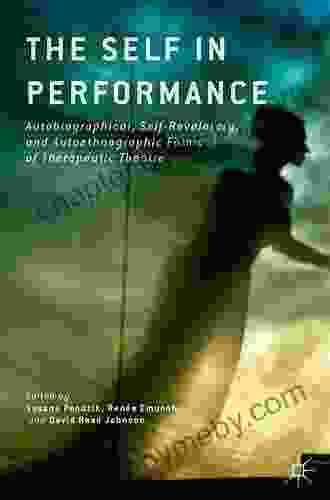Autobiographical, Self-Revelatory, and Autoethnographic Forms of Therapeutic Writing: Unlocking the Power of Personal Narratives for Healing and Growth

Writing has long been recognized as a powerful tool for personal growth and healing. In recent years, there has been a growing interest in the therapeutic benefits of autobiographical, self-revelatory, and autoethnographic forms of writing. These forms of writing allow individuals to explore their experiences, process trauma, foster self-discovery, and promote healing.
4.6 out of 5
| Language | : | English |
| File size | : | 1141 KB |
| Text-to-Speech | : | Enabled |
| Screen Reader | : | Supported |
| Enhanced typesetting | : | Enabled |
| Word Wise | : | Enabled |
| Print length | : | 273 pages |
Autobiographical Writing
Autobiographical writing is a form of writing that tells the story of one's life. It can be written in a variety of forms, including memoirs, personal essays, and journals. Autobiographical writing can be a powerful tool for self-discovery and healing. By writing about their experiences, individuals can gain a deeper understanding of themselves, their strengths, and their weaknesses.
Autobiographical writing can also be a way to process trauma. By writing about traumatic experiences, individuals can begin to make sense of what happened and to heal from the pain. In one study, researchers found that women who wrote about their experiences of sexual abuse were more likely to experience a reduction in symptoms of post-traumatic stress disFree Download (PTSD).
Self-Revelatory Writing
Self-revelatory writing is a form of writing that explores personal experiences and emotions in a raw and honest way. It is often written in the first person and can include topics such as love, loss, grief, and addiction. Self-revelatory writing can be a powerful tool for self-discovery and healing. By writing about their experiences, individuals can gain a deeper understanding of themselves and their emotions.
Self-revelatory writing can also be a way to connect with others. By sharing their stories, individuals can help others to feel less alone and to understand their own experiences. In one study, researchers found that people who read self-revelatory writing were more likely to feel empathy and compassion for others.
Autoethnographic Writing
Autoethnographic writing is a form of writing that combines personal experience with research and theory. It is often written in the first person and can explore topics such as culture, race, gender, and sexuality. Autoethnographic writing can be a powerful tool for self-discovery and social change. By writing about their experiences, individuals can challenge stereotypes and promote understanding.
Autoethnographic writing can also be a way to connect with others. By sharing their stories, individuals can help others to understand their own experiences and to see the world from a different perspective. In one study, researchers found that people who read autoethnographic writing were more likely to develop a more positive view of themselves and their place in the world.
The Benefits of Therapeutic Writing
There are many benefits to therapeutic writing, including:
- Self-discovery: Therapeutic writing can help individuals to gain a deeper understanding of themselves, their strengths, and their weaknesses.
- Processing trauma: Therapeutic writing can help individuals to process traumatic experiences and to heal from the pain.
- Emotional expression: Therapeutic writing can provide individuals with a safe and supportive space to express their emotions.
- Self-compassion: Therapeutic writing can help individuals to develop self-compassion and to accept themselves for who they are.
- Growth and change: Therapeutic writing can help individuals to grow and change by fostering self-awareness and promoting healing.
How to Get Started with Therapeutic Writing
If you are interested in trying therapeutic writing, there are a few things you can do to get started:
- Choose a topic that is meaningful to you. This could be anything from a traumatic experience to a personal relationship.
- Find a quiet and comfortable place to write. You may want to set aside a specific time each day for writing.
- Write in a stream-of-consciousness style. Don't worry about grammar or spelling. Just let your thoughts flow freely onto the page.
- Be honest and raw. Don't censor yourself. Write about your experiences and emotions in a way that is true to you.
- Be patient. Therapeutic writing can be a slow process. Don't expect to see results overnight. Just keep writing and see what happens.
Autobiographical, self-revelatory, and autoethnographic forms of writing can be powerful tools for healing and growth. By writing about their experiences, individuals can gain a deeper understanding of themselves, process trauma, foster self-discovery, and promote healing. If you are struggling with a difficult life experience, therapeutic writing may be a helpful way to cope and heal.
4.6 out of 5
| Language | : | English |
| File size | : | 1141 KB |
| Text-to-Speech | : | Enabled |
| Screen Reader | : | Supported |
| Enhanced typesetting | : | Enabled |
| Word Wise | : | Enabled |
| Print length | : | 273 pages |
Do you want to contribute by writing guest posts on this blog?
Please contact us and send us a resume of previous articles that you have written.
 Book
Book Novel
Novel Page
Page Chapter
Chapter Text
Text Story
Story Genre
Genre Reader
Reader Library
Library Paperback
Paperback E-book
E-book Magazine
Magazine Newspaper
Newspaper Paragraph
Paragraph Sentence
Sentence Bookmark
Bookmark Shelf
Shelf Glossary
Glossary Bibliography
Bibliography Foreword
Foreword Preface
Preface Synopsis
Synopsis Annotation
Annotation Footnote
Footnote Manuscript
Manuscript Scroll
Scroll Codex
Codex Tome
Tome Bestseller
Bestseller Classics
Classics Library card
Library card Narrative
Narrative Biography
Biography Autobiography
Autobiography Memoir
Memoir Reference
Reference Encyclopedia
Encyclopedia Ted Zeff
Ted Zeff Michael Miller
Michael Miller Maxine Van Evera Lupo
Maxine Van Evera Lupo Michael Alvear
Michael Alvear Rocky Mcelveen
Rocky Mcelveen Michael R Heinlein
Michael R Heinlein Michael Reid
Michael Reid Perce Harpham
Perce Harpham Ugur Akinci
Ugur Akinci Meghan Gottschall
Meghan Gottschall Taylor Dibbert
Taylor Dibbert Reginald Dipwipple
Reginald Dipwipple Mason Donovan
Mason Donovan Sadie Radinsky
Sadie Radinsky Megan Whalen Turner
Megan Whalen Turner Melinda Hardin
Melinda Hardin Paul Aker
Paul Aker Rosemarie Lengsfeld Turke
Rosemarie Lengsfeld Turke Michael G Long
Michael G Long Vinton Mccabe
Vinton Mccabe
Light bulbAdvertise smarter! Our strategic ad space ensures maximum exposure. Reserve your spot today!

 Walter SimmonsCall Me: The Ultimate Guide to Getting Girl's Phone Numbers Without Getting...
Walter SimmonsCall Me: The Ultimate Guide to Getting Girl's Phone Numbers Without Getting... Cruz SimmonsFollow ·5.3k
Cruz SimmonsFollow ·5.3k Ibrahim BlairFollow ·14.4k
Ibrahim BlairFollow ·14.4k Scott ParkerFollow ·13.2k
Scott ParkerFollow ·13.2k Pete BlairFollow ·8.2k
Pete BlairFollow ·8.2k Joseph FosterFollow ·5.1k
Joseph FosterFollow ·5.1k Ivan TurnerFollow ·4.1k
Ivan TurnerFollow ·4.1k Dominic SimmonsFollow ·19.6k
Dominic SimmonsFollow ·19.6k Isaac AsimovFollow ·9k
Isaac AsimovFollow ·9k

 Henry James
Henry JamesCold War Fighter Pilot Story: A Captivating Tale of...
Enter the Cockpit of...

 Rudyard Kipling
Rudyard KiplingYour Body Your Baby Your Choices: The Essential Guide to...
Pregnancy and...

 Fabian Mitchell
Fabian MitchellMichelle Obama: An Intimate Portrait - A Must-Read for...
Michelle Obama is a prominent figure in...

 Juan Butler
Juan ButlerUncover the Secrets of the Dead Land Warshawski Novels
Prepare to delve...
4.6 out of 5
| Language | : | English |
| File size | : | 1141 KB |
| Text-to-Speech | : | Enabled |
| Screen Reader | : | Supported |
| Enhanced typesetting | : | Enabled |
| Word Wise | : | Enabled |
| Print length | : | 273 pages |














